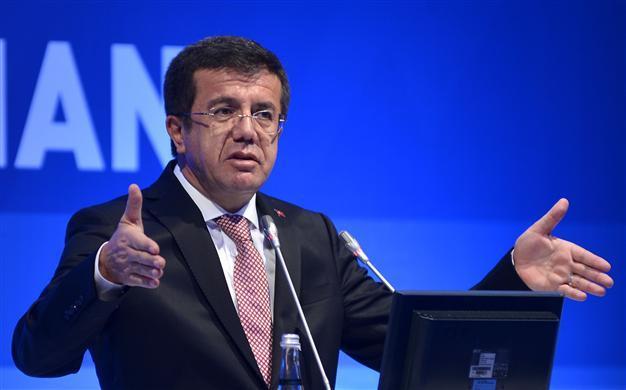Turkey demands part in EU, US free trade talks
BRUSSELS – Anadolu Agency

Minister Zeybekci said more than 40 percent of Turkey´s total foreign trade was with the EU. AA Photo
Turkish Economy Minister Nihat Zeybekci has warned Turkey may pull out of a customs agreement with the European Union if the bloc finalizes Transatlantic Trade and Investment Partnership (TTIP) talks without Ankara.Zeybekci’s comments on June 25 came as the EU and U.S. continue to negotiate on ways to eliminate barriers to trade, including reducing tariffs on goods, differences in technical regulations, standards and approval procedures for goods and services, to make it easier to buy and sell goods and services between the two.
Speaking to reporters after meeting with Belgium Deputy Prime Minister and Economy Minister Johan Vande Lanotte and Karel De Gucht, the EU trade Commissioner from Belgium, Zeybekci said more than 40 percent of Turkey´s total foreign trade was with the EU.
He said the customs agreement between the EU and Turkey from 1995 was no longer relevant.
“Turkey is the only non-EU country that has a Customs Union Agreement that came into force on Dec. 31, 1995, and is far from responding to the needs of today. It was unacceptable in terms of unfair competition after the EU signed a free trade agreement with third countries,” he said.
“It is not something that is acceptable for Turkey. Turkey should be included in the scope of the new TTIP agreement.”
Zeybekci also said Turkey was in a disadvantageous position because of the 1995 agreement, claiming it has to lower customs duties for a third of EU countries, but does not benefit from those countries lowering their customs duties in return, as Turkey is not yet an EU member.
He said: “Algeria and Mexico can sell goods to Turkey without customs duties, but Turkish exporters cannot sell to these countries.
“The customs agreement with the EU does not have any mechanism to force these countries to sign a free trade agreement with Turkey.”
The Customs Union Agreement allows Turkey and the European Union to exchange goods without any customs restrictions.
Zeybekci said he wanted Turkey to take part in talks when the EU negotiates or initiates free trade agreements with third countries.
“Turkey should automatically be involved,” he said.
Zeybekci added that Turkey was not satisfied with its current deal with the EU because agriculture, services and public procurement had been excluded from the scope of its terms.
“In 1995, there may have been good reasons, but today, Turkey sees it as a disadvantage,” he said.
Turkey is the only non-EU country that has a Customs Union Agreement, which was a keystone to prospective EU membership for Turkey.
As a signatory of the agreement, Turkish officials argue that free trade agreements signed by the EU with other countries effectively open Turkey’s market to exports from them, but also effectively block Turkey from the tax advantages associated with exporting goods to the same states, since Turkey is not a party to the deals.
















